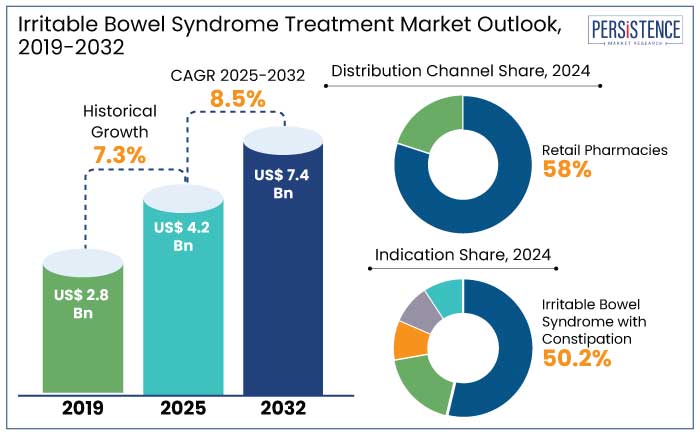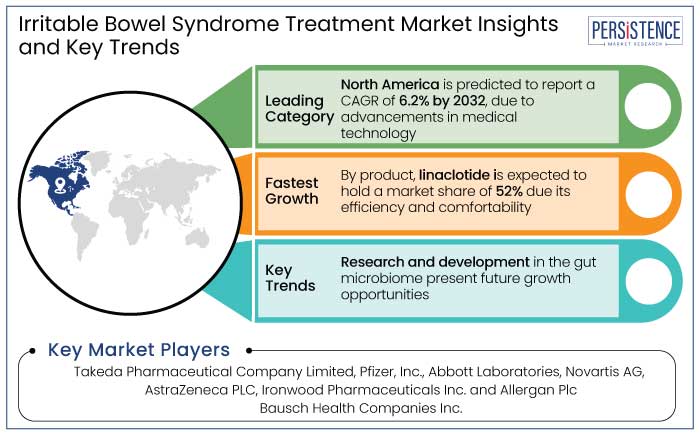Industry: Healthcare
Published Date: January-2025
Format: PPT*, PDF, EXCEL
Delivery Timelines: Contact Sales
Number of Pages: 185
Report ID: PMRREP9938
The global irritable bowel syndrome treatment market is estimated to reach a size of US$ 4.2 Bn in 2025. It is predicted to rise at a CAGR of 8.5% through the assessment period to reach a value of US$ 7.4 Bn by 2032.
The demand for treatments for irritable bowel syndrome (IBS) is expanding quickly due to rising awareness, prevalence, improvements in medication development, and the introduction of efficient therapies.
IBS is a prevalent gastrointestinal disorder characterized by symptoms such as constipation, diarrhea, bloating, and abdominal pain.
The elderly population, being more susceptible to gastrointestinal disorders, is contributing to growth. Clinical trials like fecal microbiota transplantation (FMT) are gaining popularity owing to their promising results in managing IBS symptoms.

Key Highlights of the Market
|
Market Attributes |
Key Insights |
|
Irritable Bowel Syndrome Treatment Market Size (2025E) |
US$ 4.2 Bn |
|
Projected Market Value (2032F) |
US$ 7.4 Bn |
|
Global Market Growth Rate (CAGR 2025 to 2032) |
8.5% |
|
Historical Market Growth Rate (CAGR 2019 to 2024) |
7.3% |
IBS treatments market in North America is anticipated to report a CAGR of 6.2% from 2025 to 2032. This growth is anticipated to be propelled by improvements in diagnosis and expanded insurance coverage in the region.
North America is estimated to hold a share of 38.2% in 2025, owing to rising expenditures in research and development activities. Advanced healthcare infrastructure and growing knowledge of IBS management tactics have made North America a global leader in the IBS treatment industry.
Personalized therapy modifications are now possible owing to the introduction of digital health solutions for managing IBS, including gut health tracking apps. The region employees individualized programs and novel medicines, thereby fostering growth.
Rising demand for IBS treatments in Asia Pacific is witnessing expansion owing to better access to healthcare, rising wellness awareness, and the need for efficient treatment alternatives.
In 2025, the region is projected to hold a share of 29.6% reflecting its growing focus on addressing gastrointestinal disorders.
Rising demand for cutting-edge treatments are expected to propel growth in the Asia Pacific irritable bowel syndrome treatment market, exhibiting a CAGR of 9.8% through 2032.
In order to improve symptom tracking and individualized treatment programs, Japan and India are putting modern diagnostics and digital health systems into place. China has launched a nationwide gut health initiative to increase public awareness about IBS symptoms and available treatments.
Irritable bowel syndrome with constipation (IBS-C) is a severe condition causing persistent constipation, abdominal discomfort, and potential complications like hemorrhoids and reduced bowel function. In 2025, IBS-C is projected to attain a share of 50.2%, owing to rising awareness, advancements in treatment options, and increased healthcare spending.
Research in gut microbiome is enhancing IBS-C understanding, leading to innovations in targeted therapies. Rising prevalence of chronic constipation and hemorrhoids complications are expected to sustain growth.
Linaclotide drug is gaining traction in managing chronic constipation and irritable bowel syndrome due to its high efficacy and increasing adoption rate. In 2025, Linaclotide is expected to account for 52% of share in the IBS treatment market. This growth is anticipated to be driven by its ability to enhance gut motility and effectively alleviate symptoms.
Advancements in formulation and delivery systems have enhanced patient compliance, thereby increasing adoption rates.
The medication is a favorite among medical experts for treating IBS because of its well-tolerated nature and low adverse effects.
Global research and development efforts, growing awareness, and rising prevalence of IBS are bolstering the demand for their treatments. Integration of digital health solutions and mobile apps for managing IBS and tracking symptoms has improved patient care by providing personalized medicine approaches.
Precise diagnosis and treatment approaches were made possible with the introduction of sophisticated diagnostic techniques. Increasing use of combination therapies and probiotics is transforming the market, with a focus on understanding the gut-brain axis' impact on IBS symptoms.
Increased healthcare coverage and investments in microbiome-based therapeutics have expanded the demand for IBS treatments. This is because they meet the need for non-invasive and efficient alternatives.

The global irritable bowel disorder market recorded a CAGR of 7.3% in the historical period ranging between 2019 and 2023. The stomach, small intestine, and gastrointestinal tract are all impacted by the chronic illness known as irritable bowel syndrome. Constipation, acidity, cramps, bloating, diarrhea, and stomach discomfort are some of the symptoms.
Frequent intake of fried foods, heavy in fat caused digestive problems and irregular eating habits, aggravating IBS among the population.
IBS may be related to an overabundance or overgrowth of bacteria in the intestines and usually follows severe diarrhea brought on by bacteria or viruses.
According to studies, individuals having IBS may have different bacteria than healthy people. Demand for IBS cure is estimated to record a considerable CAGR of 8.5% during the forecast period between 2025 and 2032.
Awareness Regarding IBS Symptoms and Treatment Spikes Patient Consultations
Rise in awareness regarding the IBS symptoms and treatment options has significantly increased patient consultations. This is despite the fact that the condition is often underdiagnosed due to limited knowledge about its symptoms.
Advancements in digital health tools, such as smartphone apps for tracking symptoms and virtual consultations, have made expert advice more accessible. The availability of personalized treatments, including dietary adjustments and innovative therapies, is boosting patient engagement.
Comprehension of Gut-Brain Axis and Microbiome Influences Presents New Approaches
Understanding the role of gut-brain axis and microbiome in IBS is transforming treatment methods while providing new means for effective management. Gut-brain communication disruptions and gut microbiome imbalances contribute to IBS symptoms, prompting the development of novel therapies targeting these mechanisms.
Integration of gut-brain and microbiome knowledge in personalized treatment plans is revolutionizing IBS management and enhancing patient outcomes. Development of probiotics and treatments centered on the microbiome is estimated to advance with worldwide funding in microbiome research expected to reach US$ 1.5 Bn by 2026.
Social Stigma Regarding IBS
Several people having irritable bowel syndrome conceal their symptoms and choose to endure their sufferings in quiet because the ailment is frequently unexpressed.
The market is likely to suffer as a result of this reputation. The huge stigma around the condition results in underreporting, resulting in a large number of undiagnosed patient population.
Lack of accurate prevalence data hampers market projections and investment in research and development activities for IBS-specific therapies. Inability to openly address the condition in professional settings discourages employers from adopting supportive measures, further perpetuating stigma.
Intensifying Research and Development Activities to Improve IBS Medication
Advancements in research and development in novel therapeutic approaches for IBS management addresses unmet needs in treatment efficacy and patient outcomes. IBS affects 10 % to 15% of the global population, prompting increased focus on innovative therapies like gut microbiome modulation, gut-brain axis therapies, and non-pharmacological solutions like fecal microbiota transplantation.
Pharmaceutical companies are investing in combination therapies, like pairing probiotics with anti-inflammatory agents, to enhance symptom relief.
Firms Opt for Retail Pharmacies to Streamline Supply Chain Operations
Retail pharmacies play a pivotal role in the distribution of medications for irritable bowel syndrome. This growth is highly driven by their accessibility and ability to cater to the rising awareness of treatment options.
These stores provide a large selection of prescription pharmaceuticals, over-the-counter meds, and dietary supplements for individuals looking for quick relief from IBS symptoms.
Retail chains of pharmacies are leveraging digital tools for online consultations and medication delivery. This assists in expanding their network in developing regions and enhancing healthcare awareness to maintain market leadership.
Leading manufacturers are actively working on the creation of cutting-edge technology and creative solutions in an attempt to improve their product offers globally. Key participants in the irritable bowel syndrome treatment industry are increasingly taking part in strategic mergers and acquisitions.
They are also adopting other consolidation tactics, like the launch of new medications. In addition to increasing their market presence, these initiatives seek to improve patient treatment options and increase their ability to compete by utilizing synergies.
Recent Industry Developments
|
Attributes |
Details |
|
Forecast Period |
2025 to 2032 |
|
Historical Data Available for |
2019 to 2024 |
|
Market Analysis |
US$ Billion for Value |
|
Key Regions Covered |
|
|
Key Market Segments Covered |
|
|
Key Companies Profiled in the Report |
|
|
Report Coverage |
|
|
Customization and Pricing |
Available upon request |
By Product
By Indication
By Distribution Channel
By Region
To know more about delivery timeline for this report Contact Sales

The market size is set to reach US$ 7.4 Bn by 2032.
Yes, IBS is a lifelong but manageable disease and poses no major health risks.
In 2025, North America is set to attain a market share of 38.2%.
In 2025, the market is estimated to be valued at US$ 4.2 Bn.
Takeda Pharmaceutical Company Limited, Pfizer, Inc., Abbott Laboratories, Novartis AG, and AstraZeneca PLC, are a few key players.